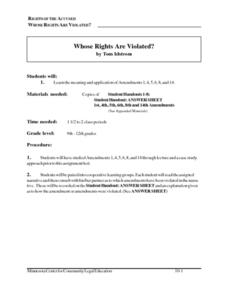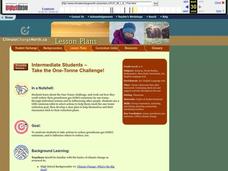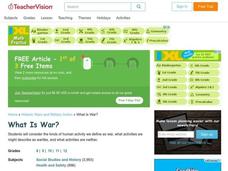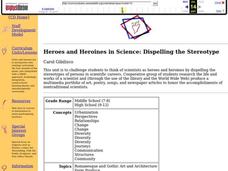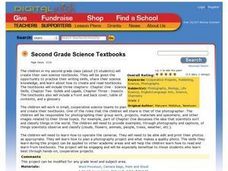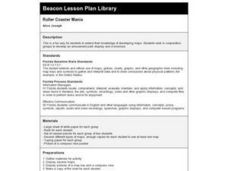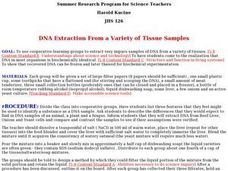Curated OER
Whose Rights Are Violated?
Learners examine the 1st, 4th, 5th, 6th, 8th and 14th Amendments to the Constitution. They work with a partner to determine which amendment has been violated while working on a worksheet.
Curated OER
Endangered Animals Books
Middle schoolers research endangered species and create and publish books to present their findings. Designed to use Inspiration software, this resource could be adapted if you don't have access to the program. Contains handy website...
Curated OER
Getting Involved at School
Students discuss ways to get involved in activities at school. In groups, they brainstorm a list of qualities of a person who is engaged in civics and how they can become involved in activities at school related to government. They...
Curated OER
Take the One-Tonne Challenge!
Students investigate the One-Tonne challenge, and work out how they could reduce their greenhouse gas (GHG) emissions by one tonne, through individual actions and by influencing other people.
Curated OER
The Photoelectric Effect
After some online instruction, chemistry aces use their creative abilities to produce a poster describing the photoelectric effect and one type of imaging technology that uses electromagnetic radiation. This simple, straightforward...
Curated OER
Ivan the Fool: Lesson 3
Learners read and analyze the Eastern European folktale of 'Ivan the Fool.' They discuss the term 'quest,' identify quests in their own lives, and in small groups design a board game that illustrates the czar's quest to find good wives...
Curated OER
What Is War?
What kinds of human activity do we define as "warlike"? Middle and high schoolers examine various definitions of war and types of warfare, especially as these descriptions relate to the kinds of war we are witnessing at the beginning of...
Curated OER
Hug O' War
Students discuss philanthropic behavior. In this philanthropy lesson, students read Shel Silverstein's Hug O' War and brainstorm ways of working together.
Curated OER
Native American Unit: Internet Center
Students explore the use of classroom management while using centers in cooperative grouping. Prospective teachers observe a video of young students working on iBooks in a classroom setting. Teachers explore strategies to ensure students...
Curated OER
Mercer Mayer 2: Peer Experts Teach Kispiration
Pupils observe a model classroom of cooperative groups in action. After the video, students discuss how to organize the classroom to promote cooperative learning. They examine the difficulties in allowing pupils to work in small groups.
Curated OER
Quoting the Dalai Lama
Students read and reflect on statements made by the Dalai Lama and
discuss with cooperative group members what they believe is
meant by the statement and how to report this information the
rest of the class. They take turns presenting...
Curated OER
Mercer Mayer 1: Guided Reading and Using Concept Maps
Students observe a model classroom of children working in a cooperative group activity. After the video, students discuss how cooperative group learning is used to be most effective. They explore the effectiveness of giving well thought...
Curated OER
STONEHENGE
Students work in cooperative groups to create a theory about the origin of Stonehenge. Each member of the group has a specific role, responsibilities and tasks. The group work can be implemented as a scaffolding technique.
Curated OER
Is it Really Winter in Australia? It is June!
The purpose of this activity is to determine how the location of a place on the Earth (hemisphere) determines what season that place is experiencing relative to the Sun's rays. Day one the students will be introduced to the terms...
Curated OER
Heroes and Heroines in Science: Dispelling the Stereotype
Students describe and illustrate a stereotypical scientist. They work in cooperative groups to research and produce a portfolio of work honoring a randomly chosen nontraditional scientist. Students create a presentation about their...
Curated OER
Heroes and Heroines in Science: Dispelling the Stereotype
students think of scientists as heroes and heroines by dispelling the stereotypes of persons in scientific careers. They work in cooperative groups to research the life and works of a scientist and (through the use of the library and the...
Curated OER
Second Grade Science Textbooks
Second graders create their own science textbooks. They work in small, cooperative science teams to plan and create their textbooks. In addition, they photograph their group work, projects, materials and specimens, and other images.
Curated OER
Who's Town is This, Anyway?
Fifth graders work in cooperative groups to simulate a town government as they consider an important change in their community growth. They analyze a real problem in the community and then determine their goals to fix it and make a...
Curated OER
Roller Coaster Mania
Fifth graders extend their knowledge of developing maps. They work in cooperative groups to develop an amusement park display and a brochure.
Curated OER
Scenic Attractions In Four Corners
Fourth graders find and list scenic attractions in SE Utah and the Four-Corners-region. They receive direct instruction and carry out activities in cooperative group settings. They combine their findings onto one large map at the end of...
Curated OER
DNA Extraction From a Variety of Tissue Samples
Pupils, working in cooperative groups, extract very impure samples of DNA from a number of tissue samples. They determine how the samples can be preserved and how they are similar.
Curated OER
Jobs on a Ship
Students facilitate each student's comprehension of the different jobs on a ship and the job's evolutions over time. They compare/contrast certain jobs on a ship from history to today. Students work together in cooperative groups to...
Curated OER
Tour of Our Century
Students will research the politics, arts, social climate, technological and
scientific advances of the 1900s. They will work in cooperative groups to
identify the most significant advances of one decade then use a computer to create a...
Curated OER
Do a Ditty
Fourth graders work in cooperative groups to create a ditty to teach the characteristics that distinguish literary forms to younger students. The ditty is performed before the class.
